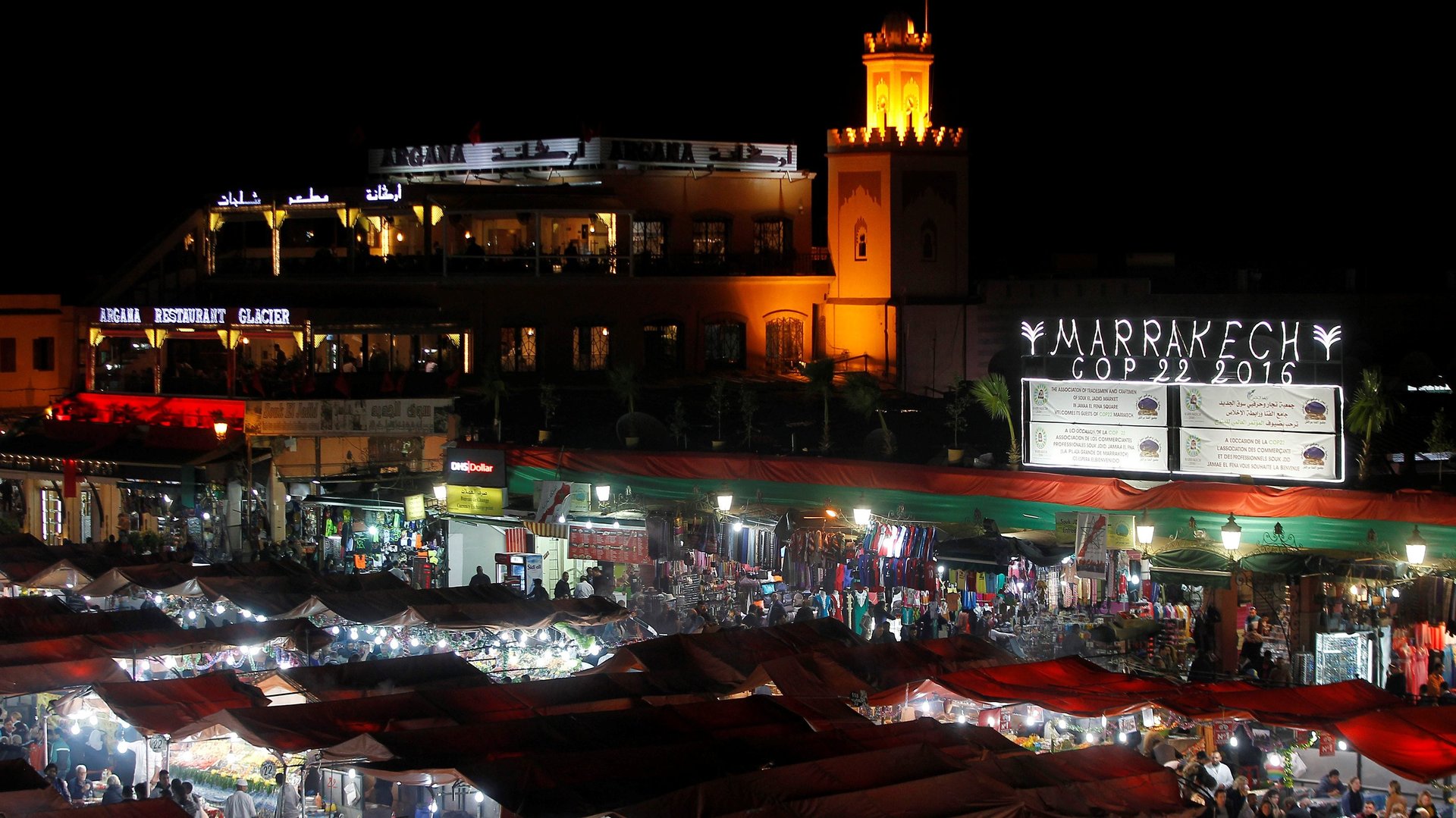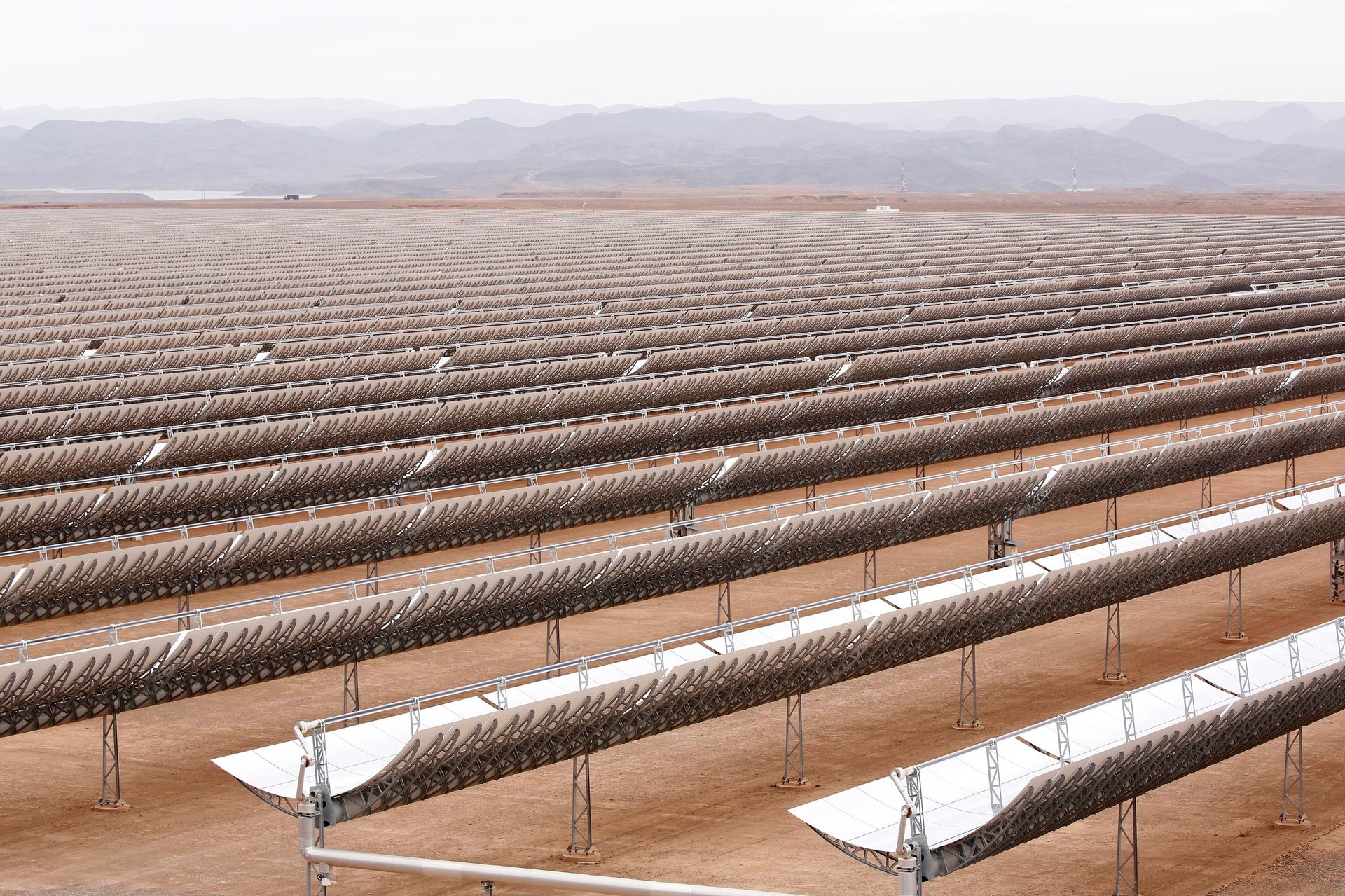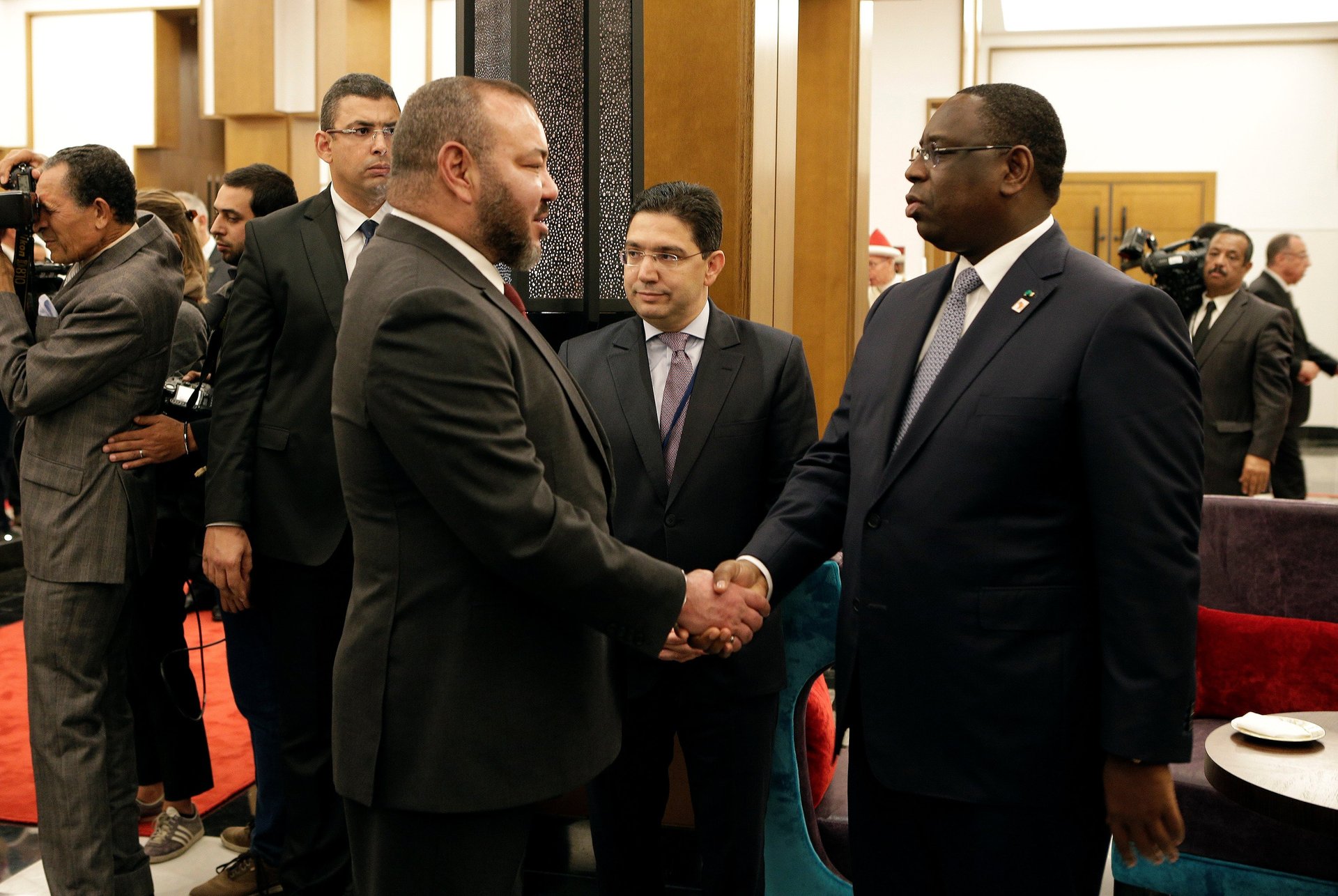There’s an unhappy story of social discontent hidden under Morocco’s glossy COP22 presentation
Marrakesh, Morrocco


Marrakesh, Morrocco
“The eyes of the world are upon us,” declared Salaheddine Mezouar, Morocco’s Foreign Minister, in the press conference that kicked off COP22, the annual environmental conference hosted by the United Nations Framework Convention on Climate Change.
The UN has come to Marrakesh to build on COP21 and last year’s pivotal Paris Agreement to stem the effects of climate change. In Morocco’s tourism capital, the government has erected giant temporary structures, designed to look like Morocco’s historic cities, to host COP22 events. Plastic fences imitate the appearance of Morocco’s walled cities and the on-site restaurant built from wood scraps is faithful to the historic desert architecture.
As COP22’s host country, the Kingdom plans to use the spotlight to showcase its economic progress and environmental prowess: in the past half-decade or so, Morocco has a emerged as a global “a green leader” that is “setting an example” for other developing countries.
In 2012, Morocco phased out fossil fuel subsidies and shifted focus to renewables. The Kingdom’s heralded environmental master plan, “Plan Maroc Vert,” relies on a combination of public funding and foreign direct investment to fund small scale initiatives meant to encourage farmers to work in more eco-friendly manners, like direct seeding and drip irrigation, and high-cost infrastructural projects, like solar and wind plants.
Near the city of Ouarzazate at the Sahara Desert’s edge, Morocco is building the 5,000-acre Noor Solar Power Station that will generate 580 megawatts once complete in 2018. The country’s “Energipro” initiative has given it Africa’s largest wind farm: a 300 megawatt project near the city of Tarfaya. And the Kingdom wants to ingratiate climate change projects into its cultural fabric by equipping 600 mosques countrywide with solar panels. The Guardian reports that the mosque solar panel project, initiated fall 2016, is expected to reduce the mosques’ energy usage by 40%. Morocco currently gets 28% of its energy from renewable sources and it could be well be on its way to its goal of 50% by 2030.
But many say that, like the temporary structures erected in Marrakesh, much of this progress is a facade, overstating Morocco’s successes and hiding how the country remains plagued by economic inequality and fragile politics.
* * *
Morocco started building renewable infrastructure initially out of necessity, because, unlike many resource-rich Middle Eastern countries, the Kingdom doesn’t sit on top of an abundance of oil or natural gas. Now, the country—situated as a crossroads between the Middle East and sub-Saharan Africa—has begun to parlay its green success into becoming a bigger player among its neighbors to the south.
About 85% of Morocco’s foreign direct investment goes to Africa and the Kingdom is currently attempting to strengthen political ties with the continent to match its economic activity. This past fall, King Mohammed VI travelled around Africa, with diplomatic trips to Senegal, Tanzania, Rwanda, and Ethiopia, among others.
Morocco’s growing economic sway may offset the political discord that has, for 32 years, prevented the Kingdom from joining the African Union (AU). Morocco’s claim of the Western Sahara—which it calls its “Southern Provinces”—has long put it at odds with international consensus. The AU has long been sympathetic to the position of the Polisario Front, which claims to be the Western Sahara’s government-in-exile. However, as nations have deepened their economic ties with Morocco, many have voiced approval for Kingdom’s bid to rejoin the AU.

Badr Ikken, general-director of the Research Institute for Solar Energy and New Energies, hopes African countries ingratiate themselves with Morocco in another way: by seeing it as a model that proves a country in an early stage of development can invest in renewables and move towards self-sufficiency and economic growth. Because there isn’t fossil-fuel reliant energy infrastructure in place in Africa like there is in Europe and the Middle East, it’s not about transitioning to renewables, but creating a new energy ecosystem entirely, says Ikken.
That means there’s tons of economic opportunities for Moroccan renewable energy NGOs to score development deals. Ikken, for example, is at COP22 to showcase his organization’s climate change mitigation and energy efficiency successes. Yossef Ben-Meir of the Marrakesh-based High Atlas Foundation is going to host a carbon auction on Nov. 17 in COP’s “green zone” where local initiatives—NGO, cooperatives and research institutes—showcase their work. Fifteen Moroccan villages affiliated with High Atlas have planted 540,000 trees in recent years, and at the carbon auction, these villages, will sell the carbon emissions offset associated with those trees.
Morocco’s branding effort has extended beyond showcasing its environmental initiatives. For example, COP-goers will enjoy access to services like Skype and FaceTime, as Morocco has recently lifted the VOiP (Voice Over IP) ban that disabled video and audio calling on social platform. The ban was implemented in March and Morocco claims its reversal, made less than a month before COP22, was motivated by global trends and public backlash, but many assume the real reasons had to do with the conference.
A virtual protest launched on Twitter suggests that the VOiP ban lift is just Morocco’s government trying to shift attention away from anything that could suggest the Kingdom isn’t democratic in the eyes of COP-goers.
Morocco has been able to attract foreign investment and progress ahead of its neighbors due to its political stability. And so inklings of political instability could change the story of Morocco being a “green power” and complicate the monochromatic image the Kingdom intends to project.
The UN estimates that the Arab Spring resulted in over $600 billion in losses due to the stifling of growth throughout the Middle East, but Morocco and its economy largely managed to sidestep the effects of political instability. Economic growth is still slow, but according to the World Bank, has been stronger than it is in neighboring countries. Foreign investment is up, and tourism hasn’t gone down as it has elsewhere in the region.
Underneath all that investment and resulting green success is a darker reality: the country still suffers from high unemployment (20.6%), especially among youth (39.9%). Riccardo Fabiani, a senior analyst and north Africa specialist with the Eurasia Group, a political risk consultancy firm, says finding good jobs in Morocco is particularly challenging for the young and university-educated. Corruption within the corridors of power remains a problem. Moroccans are disillusioned. They hear those in power repeatedly brand the Kingdom as an “exception” but don’t see the benefits of economic development, as it has been far from inclusive.

“There is an obsession in Morocco with attracting foreign investment [into renewable energy], an obsession with mega-projects,” says Fabiani. But most actual Moroccans see none of that investment. “It’s like talking about two separate economies,” he says. There is “no distribution of the benefits of this foreign investment to the rest of the economy.”
This disaffection bubbling underneath the shiny green image Morocco portrays of itself came to a head in the recent demonstrations following the death of Mouhcine Fikri.
On October 28, Fikri, a fishmonger in the northern city of al Hoceima, bought $11,000-worth of Mediterranean swordfish from a fisherman. But before he could sell his goods, police confiscated the fish—for reasons of environmental conservation, it is illegal to catch swordfish during the months of October and November in al Hoceima. Afterwards, Fikri jumped into the trash compactor to attempt to retrieve the confiscated catch and while inside, the machinery was turned on and he was ground to death. In the aftermath, rumors circulated that the police ordered the machinery to be activated and, in turn, many Moroccans have interpreted Fikri’s death as an act of state brutality and demanded investigation.
Fikri’s story is symbolic of broader Moroccan grievances against “hogra”—a dialect term, loosely translated as control and manipulation, that has become a rallying cry in demonstrations throughout Morocco. On October 30, a protestor in Rabat held a sign addressed to COP-goers that read: “Welcome to COP22, We Grind People Here.” According to regional paper RifNow, protests in al Hoceima have continued as of last Friday, coinciding with the COP Conference.
Fabiani interprets all of this—the tremendous green development, the mixed messages about open access social media, and the protests around state brutality—to be of a piece. “The authorities are obsessed with what foreigners think and what foreigners see and they are willing to do anything they can so that they can polish the image of the country,” he says.
Nevertheless, the protests don’t seem to be tarnishing Morocco’s image; this past Monday during the conference, the Moroccan Agency for Solar Energy announced it has procured funding to finance additional solar projects near the city of Midelt.